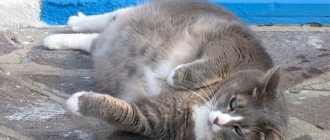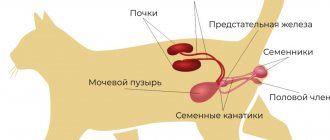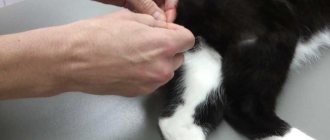Even those who do not consider themselves fans of cats cannot help but agree that they are special and mysterious creatures. Today we will reveal one of the secrets of furry pets and tell you what kind of memory cats have, its types, how long and how much information is stored in cats’ heads. You will also learn how memory and aging are connected, and whether it is possible to develop an animal’s memory.
Eh, I should have not missed the moment then...
Today, people know a lot about cute four-legged pets that can captivate anyone with their hypnotic gaze. But what is hidden behind the beautiful eyes: is it just curiosity or do cats, to one degree or another, remember what they look at?
First of all, let's understand the concept of memory. It is considered one of the highest mental functions responsible for the accumulation, preservation and reproduction of acquired knowledge and skills. It helps to navigate time and space, build relationships and accumulate experience.
Cats' memory is organized differently than humans'. The cat remembers only the information necessary for it, for example, where the tray is, a warm place, what can cause pain, or the sound of food being poured into a bowl. But she does not recognize her cub in an adult cat, since this is insignificant for them and will not help them survive in any way.
Instinct tells the cat that kittens need her care not throughout their lives, but only for a few months
Memory
Animals immediately forget minor information and, unlike humans, do not store in their memory what is not important for a prosperous existence.
For wild cats, which lead a predominantly solitary lifestyle, such an adaptation mechanism is of great importance. Instincts and memory. Scientists have repeatedly tried to answer the question about the capacity of a cat's memory. However, it is not possible to separate such complex mental functions as perception, memory and learning from instincts. Innate elements of behavior in mammals are inextricably linked with life experience, so it is impossible to say with certainty which actions the mustached-striped one has learned from memory and which it performs at the behest of instinct.
It would be more correct to think that with experience the polishing of genetically embedded knowledge and stable memorization of information occurs:
- hunting rituals are based on the instinct of a predator, but luck is honed through training with each new attempt;
- the algorithm for communicating with relatives is confirmed by socialization;
- caring for offspring is based on parental instinct, but with each lambing, the mother cat acquires practical skills and dexterity.
Trainers believe that cats cannot count, since no one has yet managed to put on a show with a tailed mathematician. However, the mother cat instantly detects the shortage of kittens, “comparing” the current picture with the familiar one and imprinted in memory. This “absence effect” allows cats to sense the departure of one of the family members or a change in the interior of the apartment.
Memory and sensitivity. Undoubtedly, the mental activity of cats is much poorer than that of humans, and their memory capacity is less.
It has been established that cats can retain in long-term memory and subsequently recognize only a few individuals or places. At the same time, the reliability of information storage is quite high and allows cats to perform truly fantastic actions.
For example, there are widespread cases of cats returning to their previous place of residence despite the distance. In Murmansk, they even decided to erect a monument to a local celebrity: a traveling cat named Semyon returned home from Moscow, having covered 2,000 kilometers in 6.5 years.
The most susceptible age of a kitten is considered to be from 2 to 8 weeks, when intensive formation of brain structures occurs along with body growth.
If the baby has not seen people or had contact with them during the specified period, then it will be difficult to tame him later. It is on the sensitivity of the psyche that the process of domestication of young jungle cats, ocelots and cheetahs is based.
Cat's memory capacity
Zoologists have made many attempts to calculate the volume of a cat's memory, i.e. How many events can a cat remember? But they couldn’t even get an approximate number. In many cases, it is impossible to establish how the animal acted in a given situation: it used knowledge stored in memory, or performed actions instinctively.
At the same time, scientists are confident that a cat’s memory capacity is significantly less than that of a human. This must mean that animals are not capable of remembering a large amount of information. But this is again a mistake.
A developed human brain stores a huge amount of completely unnecessary knowledge, while a cat’s brain “remembers” exclusively what its “owner” really needs. Cats have memory and it is much more perfect than humans, since the animal’s brain “knows how” to filter out all unnecessary information. But at the same time, it reliably protects vital events and knowledge.
How long does a cat remember?
How long does a cat's memory last? This period depends on the importance of the knowledge being stored. A simple example: a cat will instantly forget a guest who visited the owner’s house if he could not have any influence on the animal’s mood
But for all the remaining years, the cat will clearly remember the smell of a stranger who either greatly offended her, frightened her, or was very affectionate with her and treated her to her favorite treat.
Memory in cats, as already mentioned, is selective. The animal will remember for a long time the place where the tray is, or the sound with which the refrigerator door opens
The reason for this is simple: it considers this information important to itself.
Does the pet remember its owner?
Of course, he remembers, but for cats we are all alike: the cat recognizes us by smell and voice. The person who constantly lives nearby plays a significant role in the pet’s life. This is a source of food, security, affection, warmth, and also a pleasant companion with whom you can play. Of course, a cat will not forget the person who makes his life comfortable. It is difficult to say how long the owner’s pet remembers. There are many stories of cats returning to their previous owners after a few months or even a few years.
Photo source: pixabay.com
General information
The second part of the experiment tested long-term memory. The bowls were also demonstratively hidden, but the cats were allowed into the room only after 24 hours. The result was not so good in terms of how many cats remembered everything. Some of them ran towards the stern, still confidently. Some of the experimental subjects sniffed the shelter and looked for food. And some of the cats showed no interest in the search at all.
The conclusion from this study is simple - cats have short-term memory in the vast majority, but long-term memory is not observed in all individuals of the species. Therefore, you can judge what kind of memory a cat has over time only by looking at each individual cat.
INTERESTING: in cats, their ability to remember decreases with age in the same way as in a person or dog. The mechanisms of both long-term and short-term memory suffer.
Aging and the brain
As we age, the cognitive functions of the brain decline and the mind also suffers. It becomes less acute than in youth. Older cats can become easily disoriented and lost.
Therefore, it is necessary to pay special attention to your pet during this period.
Cats are amazing animals. They have many of the same qualities as humans. Memory develops according to a similar pattern: from birth and during youth it is most active, and in old age its function becomes dull.
www.petful.com, TJ Banks (May 2022)
Additional Information:
How do cats find their way home?
No one doubts the assertion that cats have memory.
. But how much can a cat remember? And how long do memories last? It turns out that cats remember more than they usually think.
Here is just one of the amazing cases proving that cats have a good memory, told by employees of one of the American veterinary clinics. One day, a thin ginger cat (Billy) was brought to this clinic and was wandering around the parking lot. The cat was 13 years old and clearly looked sick. As it turned out, the cat suffered from second-degree kidney failure.
Incredible facts about the memory of some cats
The most memory-trained cats are, of course, the cats of the Kuklachev Theater. Daily training produces results; cats show phenomenal talent for memorization.
INTERESTING: in general, almost any young cat can be taught tricks. The only question is to interest the animal in action. Food or hunting are the most effective elements of motivation in training, which form a stable memory for specific actions in cats.
Another case in the USA that confirms the memory cats have for their owners is the case of Tuffo the cat. Volunteers found him on the street and brought him to the clinic’s shelter. A few years later, the cat’s former owner came to the same clinic with another pet. The man at first doubted that the cat from the shelter was his cat, but then decided to bring with him a second cat, whom Tuffo knew. And a miracle happened: Tuffo, who had been lost during the move, recognized the second cat and the family took the whole group of purring friends back home.
But the English cat named Mac took much longer to find his way home. The animal got lost while the family was vacationing on the river. later, or rather after 6 years, the cat was found by volunteers, washed and treated.
And how many stories can you hear from those who moved and forgot the animal! There are a lot of such stories around the world and some of them have an incredible ending. In it, the cat always travels for several years to his owners in a new city and finds them. Whether this is true or whether people simply don’t want to believe that the cat got scared and disappeared during the move, we will never know for sure. However, in cases where cats, lost in dachas, later came along a familiar road to the city, this is quite real and there is no need to dispute the memory capabilities of cats in them.
Mr. Cat Recommends: Cats' Learning Ability
But cats also have genetic memory. It is guided by it that animals swim, hunt, give birth and feed their offspring. And after the kittens become independent, the female seems to forget about her purpose. Until the next birth and the next offspring.
At the same time, pets perfectly remember the daily routine of the household. They know exactly who will come and what time. And they wait for their beloved owner, sitting on the window or near the front door. The same internal mechanism causes cats to go to the bowl and ask for food at the same time.
It has been noted that if you persistently work with cats, especially from an early age, they can easily be taught certain skills and abilities. Most likely, these pets are much smarter than is commonly believed. And if they don’t know something, it’s not because they’re unable to learn something new, but precisely because they don’t want to comprehend it.
If the short-term memory of a cat was assessed in comparison with a dog, then the visual memory was compared with monkeys. And they found out that it is no worse than that of primates.
How long does a cat's memory last?
January 15, 2013
The cat's brain, of course, is less developed than the human brain, but it also contains amazing secrets of nature. Unfortunately, we will not be able to solve them in this article. But we can take you on a fascinating tour of those areas that have already been well studied!
Don't think that a cat has a small brain and is therefore stupid. It has long been proven that brain mass does not affect intelligence. The brain of a modern cat has not undergone any serious changes at all for tens of millions of years - since the time when saber-toothed tigers lived. So, the brain of these ancient predators had a slightly different structure, but then they all died out, and they were replaced by other cats - the ancestors of modern tigers, lions, panthers, lynxes and, of course, domestic cats. Is it worth judging that the Amur tiger and the gray Vaska from the third entrance have the same brain? Yes, that’s roughly how it is – the changes are completely insignificant, caused only by the environment.
As you might guess, the cat’s brain is primarily aimed at processing incoming information from the sense organs it controls and coordinating graceful cat movements
Much of the cortex—the smallest but most important part of the brain—is responsible for processing information from a cat's ears. The rest of the cortex analyzes information read by other senses
The brain body (that very “gray matter”, which in fact is not only gray, but also pink and even green) is responsible for thousands of everyday operations performed every second - from heartbeat to yawning. This same body, commonly called gray matter, controls the cat's muscles, or, to be precise, their contractions. But the cerebellum is responsible for coordination, balance and, so to speak, the correctness of movements. It is thanks to the cerebellum, which is more developed in kitties than in other mammals, that the cat is so graceful, fast and impetuous.
The brain is the command center of the entire body, and, as we see, in cats it works perfectly and harmoniously!
In this article I will talk about memory in cats. I’ll consider whether it exists and how the memorization process occurs. I will list the volume and its change with the age of the cat.
The physiology of these animals has long been studied, but some of the pet’s mental abilities raise numerous questions. Does a cat have a memory and how much? How does an animal remember and to what extent?
Out of sight, out of mind?
But it also happens differently. It seems that the cat was kindly treated by the person and even felt sad for him at first, but years later he pretends that he doesn’t know him. “Pulking!” - people think, attributing human feelings to a cat.
In fact, over the past time, another owner has taken on the role of breadwinner, drinker and protector, and the animal’s memory has erased unnecessary information about what happened before. The returning cat will take him back to his place - and after a while he will get used to him again.
Let’s make a reservation once again - these rules apply to most cats, but each case is individual. In general, when getting an animal, you need to understand the full extent of the responsibility that you take on, and try to avoid situations that can result in enormous stress for both of you. As they say, don’t part with your loved ones!
Svetlana Mosolova
Cats are mysterious creatures. If everything is clear about their internal structure, then such an abstract concept as memory raises many questions among people. Do they have such a property? What kind of memory do cats have? How does it work? How many days, months or years is it designed for? How many events and people can a cat remember? Can she forget her home and owner after a long separation?
Does a cat have the ability to remember?
Scientists have conducted many experiments involving cats. The data obtained helped to form a general idea of whether they have the ability to remember.
© shutterstock
Which memory is better formed in cats - short-term or long-term? Scientists had a goal to find out the answer to this question, and in the 70s of the last century, a group of zoologists conducted several experiments.
A group of hungry cats were shown a treat. The food was then hidden under overturned boxes. Animals observed this process. After this, they were taken out of the room for 30 minutes.
When the animals were allowed back in, almost everyone was able to find a bowl of their favorite food. They did it the first time. This proves that cats, like dogs, have an excellent (short-term) memory for recently occurring events.
The experiment also had a second part. Her conditions were the same, but cats were not allowed into the premises for 24 hours . Now the behavior of the animals was somewhat different: some of them simply sat without taking any action, the rest walked around the boxes (as if they remembered that the food was here, but under which of the boxes was a mystery to the cats). In fact, this proved that the ability to remember long-past events was practically non-existent.
“The years passed. The storm is a rebellious gust..."
But will the cat remember the person in a year? Here it all depends on how big a role your pet has assigned to you in his life.
Cats' memory for people is selective and records only what is vital for the animal - both with a plus and a minus sign.
For example, the owners of one mustachioed dog, who had undergone some very unpleasant procedures at the veterinary clinic, a year later invited Aibolit, who treated the pet, to their home. Over the past period of time, the doctor and the patient have never seen each other. And it was very funny for everyone to watch how, upon seeing the “offender,” the cat, on its belly, tried to quietly leave the corridor where, according to tradition, it had gone out to greet the guest.
And another cat, fed from a nipple by a teenage boy, immediately recognized his savior in the brave soldier who had returned from the army. The cat's joy, they say, knew no bounds, although two years have passed since the separation.
Features of memory in cats and kittens
A cat's brain is much smaller than a human's - its weight is only 1% of body weight, while a person's is 2%. But at the same time, it is similar to our brain: it also consists of neurons that form gray and white matter, is divided into frontal, temporal, parietal and occipital lobes, and the cortex is covered with convolutions, although more primitive than those of humans.
The cat's brain has a similar structure to the human brain, and the same parts of it are responsible for emotions and memory.
Scientists have long been interested in the peculiarities of cat memory. Back in the 70s of the last century, experiments were conducted on this topic. Hungry cats were shown food, then bowls were hidden in front of them under different boxes and the subjects were removed from the room. After half an hour, the cats were returned and their behavior was observed. Almost all the cats immediately ran to the right boxes and found bowls of food underneath them. However, when the experiment was extended to a day, the situation changed. During the day, the cats clearly forgot the details of the situation. Some of them showed no interest in the boxes at all, while others sniffed all the boxes in a row. That is, some cats retained memories, but they were vague.
Cats are especially good at remembering anything related to food, as this topic is vital in the wild.
A more recent experiment appears in the journal Behavioral Processes. Japanese scientists studied episodic memory in cats. This is a memory that is associated with certain events and situations. In the first part of the experiment, cats were asked to examine four bowls of food, but were only allowed to try from two bowls. Then the cats were taken out of the room for a quarter of an hour, after which they were returned, replacing all the bowls with the same empty ones, but maintaining their location. The animals were more attracted to those bowls from which they had not yet eaten. And they clearly remembered their location. In the second part of the experiment, the conditions became more complicated. Only two of the four bowls contained tasty food, one contained an inedible item, and the fourth bowl was empty. The cats were allowed to explore all the bowls and eat food from one, then they were removed from the room and returned after a while. The subjects showed interest primarily in the second remaining bowl of food, that is, they remembered the circumstances of the situation. As a result, scientists concluded that cats have episodic memory, and in the first part of the experiment, the cats remembered where the food was, and in the second, what exactly was in different places.
Without a good memory, cats would not be able to manipulate human objects, such as front doors and furniture doors.
Thus, the development of short-term and episodic memory in cats has been confirmed experimentally. And in fact, how would cats learn and master new forms of behavior without a good memory? But cats can even be trained. Proof of this are the performances of the famous Kuklachev Theater. And at home, you can teach your cat to understand certain words and follow commands: cat owners often share similar experiences on the Internet.
Many cats are excellent at carrying human objects in their teeth and can be trained to bring a newspaper or slippers to their owner.
However, a cat's memory has its own characteristics.
Cats remember best what is important to them or is colored with vivid emotions. This property of memory can be called selectivity.
Only information necessary for the safe existence of cats is remembered. In the wild, memory helps cats change their behavior in time, adapting to the situation, and survive. Therefore, they perfectly remember places where there is food or water, warm shelter, enemies or dangerous objects, but they immediately forget minor information. Memories arise involuntarily, by association with a certain picture, sounds, smells, tactile sensations, and cats cannot retrieve information from memory voluntarily, like humans.
Longevity: how long do cats remember certain events and their owner?
As a result of the experiments, scientists approximately determined the time during which cats retain memories - about 16 hours. This is a characteristic of their short-term memory. But cats only remember information that is important to them so well. For example, a cat will remember well a guest who accidentally stepped on his tail or fed the cat a tasty treat. He will forget guests who did not have direct contact with him in a few minutes.
Does a cat's memory deteriorate with age?
As a cat ages, its memory may deteriorate. Brain aging leads to disorders similar to the symptoms of Alzheimer's disease in humans: poor spatial orientation, forgetting familiar and familiar things, reluctance to play and socialize, excessive appetite or lack thereof. The pet may even forget where its toilet and feeding bowl are. This is often accompanied by hearing and vision impairment.
You should not scold an old cat for a puddle in the corner or spilled food - she will experience stress and this will shorten her life even more.
There are no guaranteed ways to prevent such disorders in cats, because people have not yet learned how to deal with the problems of aging. But preventive measures include proper nutrition, normal weight of the animal and timely contact with a veterinarian for the treatment of chronic diseases.
My old cat Milka is already 18 years old. In the last year, she has developed many changes in behavior that indicate aging of the body: the desire to sleep in warm places most of the time, poor coordination of movements, and hearing impairment. But Milka’s memory is fine, which I’m incredibly happy about. She regularly goes to her litter box and knows well where her food and water bowls are. Milka doesn’t complain about her appetite either. The only brain disorder I see is when rules are ignored. She always knew that it was impossible to climb on the table and steal food (Milka is madly in love with sausages and boiled sausage). No, of course, she climbed and stole, but when she saw the man, she immediately ran and hid under the sofa. And now, if you find her on the table eating sausage, she will not pay any attention to us and will continue to gobble it up on both cheeks. Moreover, she can climb on the table in front of my eyes and start eating sausage right from my sandwich. We, of course, do not punish her for this, but simply remove her from the scene or treat her to sausage. We can say that Milka forgot (or simply does not consider it necessary to follow) some rules. But in general, for her 18 years, she is a great fellow!
Duration of information storage
Experiments with cats and other animals made it possible to identify 2 types of memory in them:
Short-term. This mental function allows you to perceive any events, but retains information for only a short time (no more than 27 seconds). If the event is not repeated, then the “record” loses its relevance and is erased under the influence of a new piece of information - this is how the brain protects itself from overload and “cleanses itself.”
Long-term. The long-term “imprint” of events is very selective, but resistant to influences that destroy short-term memory
This mechanism records a single phenomenon or incident that is of increased importance for an individual and stores it for a long time. This is why long-term memory in animals is called “specialized memory.”
How good is a cat's memory?
There is no study yet that determines the maximum number of memories a cat can retain. What is certain is that they can not only remember situations that may be favorable or unfavorable for them, but also know whether to repeat them or not, and how to react to them.
Thanks to spatial memory, a cat can easily learn the location of objects in the house, especially those that interest them most; such as their bed, bowls and sandbox
Notice what they do when you add a piece of furniture that wasn't there before!. Are you surprised when your cat jumps into bed minutes before you do? A few days spent with you is enough to remember all your standard actions.
So, they know when you leave, what time you get up, and much more!
Are you surprised when your cat jumps into bed minutes before you do? A few days spent with you is enough to remember all your standard actions. So, they know when you leave, what time you get up, and much more!
How does a cat's memory work?
Scientists report that a cat's memory is structured almost like a human's, that is, it can be long-term and short-term. Long-term memory is responsible for remembering long-ago events, such as when a cat was a kitten. Short-term memory allows a cat to remember complex things for a period of time, such as several minutes or hours. There is no doubt about the existence of these types of cat memory, as this has been confirmed by experiments.
Cat's brain: faster than an iPhone, more complex than a dog
Theory ALL ARTICLES 27171
Photo: Sergey Vladimirov / CC
We have already written about some of the features of cat intelligence and how cat people are smarter than dog people. Let's figure out what features of the brain structure and memory function of cats distinguish them from us and from other animals!
Size is not critical.
The weight of a cat's brain is 0.9% of its body weight. For comparison, the mass of the human brain is 2% of the mass of his body, and in dogs it is on average 1.2% (however, unlike cats and people, dogs come in very different sizes). However, brain size is not directly related to intelligence level. Most often they are caused by purely physiological limitations - for example, head size. If our heads “grew” following the increase in the cerebral cortex, then at one “wonderful” moment we would simply stop being born naturally, since the size of the birth canal is also limited. Our brains will never get bigger than they are now, and the same can be said about the brains of cats or dogs. But:
The brain structure of a cat is more complex than that of a dog.
Higher nervous activity is the ability to think and make rational decisions. The cerebral cortex is responsible for higher nervous activity. The human cerebral cortex consists of more than 10 billion nerve cells. In the cerebral cortex of a cat there are 300 million nerve cells, and in a dog - what a shame - only 160 million.
Cats have better short-term memory than dogs.
It has been experimentally established that the memory of where treats are “stuck” is retained in cats for 16 hours. And dogs forget this place after 5 minutes.
Photo: Sergey Vladimirov / CC
With long-term memory everything is more complicated...
It is believed that not much information is stored in cats' long-term memory. It has been established that cats can remember certain places and certain people for many years, but, by and large, scientists still do not know how long-term memory works in cats or dogs. However, the cerebral cortex is responsible for long-term memory, and in cats it is almost 2 times more complex than in dogs (see paragraph No. 2). It is quite possible that cats’ long-term memory works better.
The cat learns by watching you.
The cat does not need to be taught how to open the refrigerator. She just needs to see you do it a few times and she will learn on her own. This is how they work: kittens learn by watching their mother - how she hunts, eats, licks herself... And then they try to repeat after her - until they learn to do everything correctly.
Photo: hehaden/CC
As cats age, brain function declines.
Older cats may develop a disease similar to Alzheimer's disease. Feline cognitive dysfunction syndrome is associated with the aging of the brain and can lead to symptoms such as depression, spatial disorientation, and inappropriate behavior. Everything is the same as in humans, but, fortunately, not all people and not all cats are susceptible to this disease.
A cat is smarter than an iPhone.
With each new generation, our smartphones and tablets become more powerful and faster. But they are still very far from cats! For example, the internal memory of an iPhone does not exceed 64 gigabytes. And a cat’s long-term memory can contain up to 91,000 gigabytes of information! At what speed do computers and cats process information? The iPhone processor produces about 170 million computational operations per second. And the cat’s brain performs 6 trillion operations during the same time! 6 trillion is 6000000000000, or six million million.
Is it possible to develop a cat's memory?
Cats can very quickly lose acquired skills, especially if they say commands in situations inappropriate for their execution. In such cases, the pet will become confused and will soon stop responding to your words.
A cat does not remember an event or object until it encounters it again or until such a need arises, since dreams, fantasies and ephemeral images have nothing to do with the skills necessary for survival.
Success in training depends on the individual characteristics of the pet
Any success must be reinforced with praise or a treat. Don't make mistakes in your actions. For example, if a cat follows the command “sit” and at the moment of reward she stands up, then she will develop a connection between raising her hind legs and the treat. Thus, she will simply misunderstand you.
Do cats remember?
Even in the last century, zoologists conducted experiments to clarify the question of what kind of memory cats have, and whether they have developed short-term and long-term memory. Hungry animals were shown their favorite food. Then, in front of their eyes, food was hidden under one of the overturned boxes, after which the cats were taken out of the room.
The essence of the actions was the same, only the animals were taken out of the premises for a day. The results have changed. Some cats simply forgot about the hidden food and did not try to look for it, while others sniffed all the boxes, trying to figure out where the smell of the treat was coming from. That is, they did not remember which drawer the food was under. So, long-term memory in these animals is less developed than short-term memory.
What else are the features of this mental process? It has been proven that it is selective in pets. You and I can remember a huge amount of information from different areas of life, past events, images, sounds, names. Much of the above does not play any role in a person’s life.
But cats remember what is important to them
The more important an object, circumstance, or event is for them, the easier they will remember it. For example, a stray animal will constantly return to the house or cafe where it was fed once
After all, this event is extremely important for the cat. An experienced mother cat cares for kittens in the second or third litter more carefully, because she remembers how she raised the cubs in previous times.
And this is another proof that these animals have long-term memory. But it also has its own time frame. After all, when the offspring grows up and they are distributed, then after a certain period of time, if the mother cat meets one of the cubs, then she simply does not recognize him, because she does not remember.
In the early 1970s, zoologists conducted a simple experiment to find out which memory is better developed in cats: short-term or long-term. Hungry cats were shown their favorite food, hidden in front of the animals under one of the overturned boxes, and then the cats were taken out of the room for half an hour.
The second part of the experiment was carried out under the same conditions, but the cats were taken out of the room for a day. Now the results have changed: some cats did not even try to look for food, others sniffed the boxes (that is, they remembered that there was food somewhere, but did not remember where). It would seem obvious that long-term memory in cats is less developed, but not everything is so simple.
How much information does a cat have in his head?
Scientists wondered how much information a cat's memory can hold. But this could not be established for certain. The line between memorization and instincts is not clear. Despite the fact that in general the memory capacity of cats is less than that of humans, they can retain a lot of information. Having thrown away everything unnecessary and leaving the main thing, they store all the knowledge they need for life.
Interesting information was published by Behavioral Processes. It has been reported that four-legged pets have episodic memory, contrary to the belief that only humans have it. What opportunities does this give the cat? It turned out that the animal is able to remember past events if it encounters them again.
This was discovered during experiments by Japanese scientists with bowls of food. The animals remembered which ones contained edible food and which ones contained inedible objects, and subsequently, the first thing they did was explore those containers from which they managed to eat the previous time. Several different tests were carried out on dozens of animals, and each of them confirmed the cat’s ability to remember the circumstances in which it found itself in a previous situation. It became clear that cats not only remember where food is, but also what to explore first to find food.
An orientation experiment was carried out by scientists from Germany. First, they gathered a group of cats from one city, took them some distance from their home and checked whether the pets could return home. All animals coped successfully. Then the task became more complicated. The cats were launched into a large labyrinth, covered from above. The building had 24 exits to different directions of the world. 98% of animals chose the exit that was located in the direction of their home.
The capabilities of cats are much wider than one might imagine. They use memory, instincts, and the ability to navigate, which sometimes leads to surprising situations.
How many events and people can a cat remember?
Scientists have no doubts about how long information is stored in the cat’s brain. It depends on its significance. Animals quickly forget the smell of a guest who did not show them attention and did not arouse their interest. At the same time, they keep in the memories for a long time the people who caused them trouble (they stepped on their tail, shouted, hit).
Zoologists have not been able to determine the volume of a cat's memory. They cannot answer the question of how many events and people the brains of these animals can contain. Numerous studies have not given a definite result, because in most cases it was not possible to find out whether they act instinctively or from memory.
One thing scientists can say for sure: felines' memory is significantly inferior to humans in volume. This is confirmed by the size of the cats' brains. In humans, it stores a lot of information that is even of little significance. A cat's brain filters incoming information, retaining only the most significant.
How does a cat remember?
Selectivity is the main difference in cat memory.
The animal constantly “keeps” in its head only what helps it survive.
The pet's ability to retain information is small, so it uses it skillfully. All information that is unimportant for existence and does not help to survive is quickly ignored. But what is important remains in the cat for a long time, and at the sight of this vital thing it is instantly removed. It is typical for a cat to live in this moment, without looking back at the past. That is why, when they become big, kittens may not even recognize their mother in an unfamiliar cat.
Learning ability
A caring owner is concerned not only with the question of what kind of memory cats have, but also whether it can be trained in order to increase the mental abilities of the pet. As zoologists assure, this is not necessary, since the kitten is taught all the necessary skills by its mother. When living together with an adult in the same house, he will observe and learn from her. If the kitten was weaned from its mother early, it will still learn the skills necessary for life, but at the level of its own instincts. If a person still needs to influence this natural process, then this can be done in several ways.
- Add more vitamins to your pet's diet.
- In addition to food, give natural products, in particular fish and meat.
- Carry out training on your own, for example, moving a bowl or bed to a new place, and then check how quickly the individual gets used to the new conditions.
- You can let the kitten out for a walk and see if he finds his way home on his own, but at this time you need to carefully monitor him so that he does not get lost.
According to zoologists, the optimal age of an animal for memory development is 2–5 years.
Details
Mechanics of cat memory
Human memory differs in mechanics from cat memory in one more aspect.
A person quite easily assimilates a large amount of information, and this information does not necessarily relate to ensuring his life. Often a person remembers something that may never be useful to him in practice. It's not like that with cats. The animal remembers only those facts that will later be used to satisfy its primary needs. Please note that the cat remembers where the food is and when it is hungry, it pulls you to this place. The cat remembers where the treats are put away, where the tray is and whether it is clean. She doesn’t remember the TV series that she may have watched while sitting next to the owner. This is simply of no use to her and is not applicable to her life support.
An interesting confirmation of the short-term nature and selectivity of memory is the moment a cat raises kittens. As a female cat, it is important to remember the algorithm for feeding and training kittens. She improves it with every litter. But after the cat grows up, it forgets about its offspring. She has already let him go into adulthood and no longer experiences any tender feelings.
INTERESTING: the most active period of development of the memory array occurs in kittens from 2 to 7 months. During this period, the baby responds well to training and is able to remember a maximum of behavioral patterns and requirements from a person.
Also, a cat, having learned to open cabinets in the kitchen in one apartment, does not immediately begin to do this in a new one. Yes, she is familiar with the subject, yes, the algorithm of actions does not immediately disappear from her brain, but nevertheless, before repeating the skill in a new room, she will study it again in order to compare the experience accumulated in memory and apply it.
Memory capacity in cats
The cat's brain stores just the right amount of memory that is important for survival. Yard cats remember how to behave with people, what to expect from dogs and how to behave in a concrete urban in order to survive.
A domestic cat does not need to remember the survival algorithm, but is very good at filtering information into its brain, for example, about guests and strangers in the house. You've probably noticed that a cat remembers regular visitors, even if it's a caregiver. And he may not perceive people close to you at all, who are rarely in your home.
Also, the cat will always remember the one who offended her. Be sure that the cat will remember an attempt on the tail, squeezing or an unpleasant voice. The cat also remembers the pranks of children, so if it is ever offended by a child of a particular age group, the cat will treat all other children with distrust and sometimes with aggression.
But we can’t talk about specific gigabytes of cat memory. Many skills become reflexes and are associated with instincts, thereby not specifically loading the areas of the brain responsible for memory.
INTERESTING: a cat always remembers its owners. Even when lost, a cat remembers its person by smell, even if a lot of time has passed. But forgetting how he got lost last time is not uncommon. This is evidenced by the facts of domestic cats repeatedly escaping through the entrance.
Does the cat remember what happened to it many years ago?
Cat old age: what to change in the conditions of detention
Cats are very good at remembering past events if they aroused strong emotions in them. For example, a cat that was thrown into the bushes by its ruthless owners right in its carrier will be terribly afraid of carriers and all closed spaces all its life, because it received truly unforgettable emotions during its stay in it.
There is also the so-called memory of ancestors, when a cat, no matter how domesticated it is, will always hunt birds and mice that come into its field of vision. This is due to the special instinct of the hunter, which is inherent in every cat by nature and is unlikely to ever be eradicated.
Learning ability
Learning is inextricably linked with memory and is based on the adaptive mechanism of acquiring and assimilating information. In everyday life, domestic cats remember the algorithm of actions and marker words if they are repeated a certain number of times and lead to the same result. So, at the word “eat”, the cat runs into the kitchen with a purr and takes a position near the bowl. The sight of a familiar box of food or the rustling sound of a treat inside has a similar effect.
It is much easier to develop skills in young cats (up to 3 years of age), and most often pets learn passively, simply by watching how a person opens a door or from which shelf they take out a treat. This is how kittens learn the behavioral elements of adult life from their mother.
Recipes for success.
The minimum number of repetitions required to transfer information about an event of little significance to a cat into long-term memory is 5.
You can achieve results in training by instilling a consistent interest in activities and based on the cats’ innate craving for hunting, playing and getting food.
When performing tricks, the individual talents of the animal are of great importance: for example, the tendency to carry various objects in its teeth or boldly overcome obstacles. Even a minor result should be positively reinforced, forming an increasingly stable connection between neurons. In turn, any negative influence is ineffective in training cats, causing fear and rejection of humans.
Freedom-loving cats still keep many unsolved mysteries, charming and delighting their owners every day.
Time and memory
So how long does a cat's memory last? It all depends on how important the stored information is for our pets. For example, a cat will quickly forget the smell of a random guest if it did not affect its mood in any way, but will remember the owner’s smell for the rest of its life if a person treats the cat properly or, conversely, physically punishes, scares or angers it
Cats remember the sound of the refrigerator being opened and the place where the tray is for a long time, if not for life, because it is important to them. But remembering what clothes the hostess was wearing at the time of the first meeting is pointless and does not bring any benefit.
Events and times
We should not forget about the event-based form of cat memory. Here our pets are completely different from us. Cats use the knowledge they need only at the moment when they really need it. Human memory allows us to retrieve information at any time, regardless of the situation.
Conventionally, it looks like this. A cat will never remember an event or fact until it encounters a similar situation again. Animals do not know how to dream and fantasize, and use their knowledge only when necessary.
Previous Question and answerImunofan for cats - instructions for use, dosage Next Question and answerProfender for cats - instructions for use











